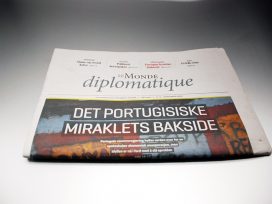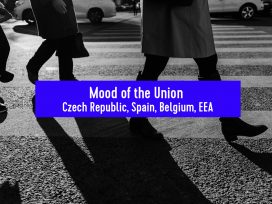Politics and cosmopolitics
2006 is the centenary year of the philosopher Hannah Arendt. Her relevance has never been greater. Arendt radically questions whether “politics” is still in the least bit significant. If opinions cannot be freely expressed, the political space disintegrates – a propensity we have witnessed in recent times. At the same time, being political involves seeing and listening to those who are “disregarded”.
“He feels himself out of the sight of others, groping in the dark. Mankind takes no notice of him. He rambles and wanders unheeded. In the midst of a crowd, at church, in the market … he is in as much obscurity as he would be in a garret or a cellar. He is not disapproved, censured, or reproached; he is only not seen […] To be wholly overlooked, and to know it, is intolerable.”1
The political thought of German-American philosopher Hannah Arendt is more relevant than ever. This year is the hundredth anniversary of her birth (1906-75). Major conferences are being planned in Paris, New York, and elsewhere. The passage above is from John Adams (1885), quoted by Arendt in On Revolution, an account of the poor and the marginalised.
It is all about politics. In her book Was ist politik? Arendt radically questions whether politics is still in the least bit significant. Bearing in mind the last century, with its world wars and genocides, or this century’s “war” against or with terror, it can seem doubtful. Heavyweight international politics is often the exercise of raw imperialist power, legitimised by self-justifying rhetoric and half-truths disseminated by the media. Furthermore, local politics is often characterised by dog-fighting between interest groups over the largest share of the spoils from the government’s coffers and departments.
This is what we usually call “politics”. But for Arendt this is actually interest-group pragmatism, which does not exactly fit under the purely political. Because the political ceases to exist when violence and power are exercised.
According to Arendt, the nature of the political is rather to be found in discussion and open debate, free from any form of coercion. Her definition of political freedom, especially freedom of expression, is just as relevant in our time, where open debate has given way to aggression, cartoon provocation, violent protest, state terrorism, or suicide bombing.
Arendt’s concept of free political space originates from the Greek polis – from equal human beings with the freedom to articulate, debate, and express their opinions. A freedom enjoyed by a minority who, equal amongst themselves, have been liberated to debate general political and philosophical issues by those who remain enslaved. A large proportion of the world, including large sections of the West, simply does not have these fora. To Arendt’s mind, they are bereft of political space.
But just as important is the power that defines who will get to sit at the “equals” table. Today the West also excludes the “disregarded” – representations are “made invisible” by turning a deaf ear. It has elements of ridiculing, ignoring or seeing others as superfluous. As in the story of the invisible poor man, one adopts an apathetic or dismissive stance.
The french philosopher Jacques Ranciére points out in his latest essay “Ten Theses on Politics”2 that politics is really about those who are unseen and about shifts in the power balance governing the invisible-making process. In other words, it is about allowing politics to be about the “superfluous”, those who remain outside the established milieu.
For Arendt and Ranciére, politics is open and free discussion – in the sense of being inclusive, meeting others. As Ranciére writes: “He who stands face-to-face with an animal who has an articulate language and the ability to express itself, knows that it is a human animal, that is, the political animal.”3 To recognise its speech and gestures. To realise, that over and above fear and conflict, we live in the same place. To understand that no one can come off the sole victor. To make the invisible visible.
These are people who represent the “surplus”, those who are extraneous, those who live in the void – what Ranciére calls the supplementary or superfluous part of the population. The poor, starving, illiterate, uneducated, sick, exploited, or just culturally different. One solves nothing by doing as the French elite have done; vulgarising the suburban youth by labelling them “rabble”. Just like the rest of us they are political beings to whom we can listen.
To be political is therefore to begin to include those people who are not included, to make visible those “who do not exist”. For example, in a positive way, through the establishment of truth commissions into those who have disappeared. Or negatively, to disturb the agenda – in the case of the Norwegian welfare state, in relation to the imperialism of the US, or the corporate mentality of ruling Western society. It is about introducing dissensus or consensus rule. Most often, the visible-making process takes place in small fora and local newspapers, since the larger media has a regrettable tendency to resemble a deafening marketplace. On an anarchistic plane, one can point out the elite’s (arche) traditional power to exclude the people (demos). It is about keeping the political space open, maintaining its variety and cultural diversity. As Zygmunt Bauman has written, it is about being able to live together in a world full of differences.
If Arendt’s greek polis of participating equals were to be transferred to our time it would have to be as a cosmopolis. A world where human rights promote equality and give rise to open encounters. One would not rule out Europe learning from the old, inclusive, and pluralistic US to which Arendt immigrated.
In the cosmopolitan world we are all world citizens. It is a world where the individual sees beyond himself and his preoccupations. Kant described it thus in 1803: “Parents care for the home, rulers for the state. Neither aim for universal good and the perfection of which man is destined and for which he has also a natural disposition. But the basis of a scheme of education must be cosmopolitan.”4
What can make us see beyond the cosy comfort of the family and interior design magazines? As Peter Kemp points out in his book The World Citizen5 it is “a community of free people.” Furthermore, Kemp would have international law enshrined within a cosmopolitarian law – based not on fear but on a rational concept of community between peoples and individuals. He also mentions the concept of the “law of hospitality”, a term borrowed from Jacques Derrida6 and others who are concerned with the notion of hospitality. In Kemp’s view, the cosmopolites must take responsibility for “epochal typical problems” such as economic globalisation, cultural and national clashes, and ecological problems like pollution, famine, and disease. Kemp and many others see the EU as perhaps the only existent basis for cosmopolitanism.
Without a cosmopolitan democracy, national democracies will not survive. Furthermore, the cosmopolite wants to separate Nation and State – likewise Church and State. Imagine a Norwegian state with several nations here in the north… The cosmopolites are the heirs to the anarchistic noblemen of old, on their way from one revolution to the next. They would have reckoned with the Dominican immigrant, the Kurdish refugee, the stateless Palestinian or the proletarian Indian in Chiapas.7 To have a cosmopolitan mindset is to live in an open and inclusive world-society in which one develops a community spirit, an awareness of the collectivity or the community of senses – whether this is cultural, artistic or socially ethical.
The cosmopolite may have lived in many different countries – born in one place, educated in a second, and worked in a third. They often leave a place in a better condition than before their arrival.
Allow me a pinch of pessimism after this tribute to the cosmopolite. Established private and national power relations are far too easily preserved. Is it not characteristic for the oppressor to grind the oppressed so far down in the dirt that the dirt-eater bites back? So what could be more typical than the “oppressor’s” shout of: “See! He beat me!” – thereby legitimising a “War on Terror” or other such posturing in an effort to consolidate his own grip on power?
More often than not politics is not a free, but rather a pragmatic and shrewd exercise of power. And maybe it is simply a necessary evil for the preservation of humankind. Politics easily degenerates into a mixture of important and trivial political issues. As Arendt herself points out, its ineffectual or miserable nature originates “clearly from the fact that all political questions today end in a dead-end street.”8
What can happen therefore to the political engagement of the individual, the responsible cosmopolite? Arendt concluded her lectures on “the history of political theory” in 1955 by likening our global political society to a desert. But there are oases to be found outside it, “life-giving springs that allow us to survive in the desert without reconciling ourselves to it.”9 The desert is composed of all the things in the world that can weaken a wretched cosmopolitan soul – conflict, misery, countless human beings and destinies. Established power relations have nine lives. And the individual is easily ensnared in their wage slavery or in the daily battle for survival. The danger is that one eventually and regrettably becomes so used to the desert that one ends up adjusting and feeling at home there.
If the oases are destroyed by sandstorms or an excluding world, there are still watering-holes to keep mind and soul together. As Arendt points out: “the oases exist free of political relations. What went wrong was the politics, our pluralistic existence and not what we can do or create as individuals: the isolation of the scientist and the artist, the intrinsic, world-less relations between people as it exists in love and, in some cases, friendship. When one heart reaches out to another, like in friendship, or when the world around them goes up in flames, like in love. Without the preservation of the oases, we would not know how to breathe.”
For even where one has freedom of expression, it would be intolerable if one were to be unseen by the other.
John Adams, Discourses on Davila, Boston 1885, quoted in: Hannah Arendt, On Revolution, London 1990, 69.
See the Swedish magazine Fronesis, 19-20.
Ibid. 105.
Immanuel Kant, On Education, 1803.
Peter Kemp, The World Citizen as Educational Ideal, Copenhagen 2005.
See Jacques Derrida, Cosmpolites de tous les pays, encore un effort!, 47.
See Per Wirtén, "Liberate the Nation -- Cosmopolitics Now!" in Arena, 2003.
Hannah Arendt, The Promise of Politics, 110.
Ibid. 202.
Published 9 March 2006
Original in Norwegian
Translated by
Nicole M. Fishlock
First published by Le Monde diplomatique (Oslo) 3/2006
Contributed by Le Monde diplomatique (Oslo) © Truls Lie/Le Monde diplomatique (Oslo) Eurozine
PDF/PRINTNewsletter
Subscribe to know what’s worth thinking about.



